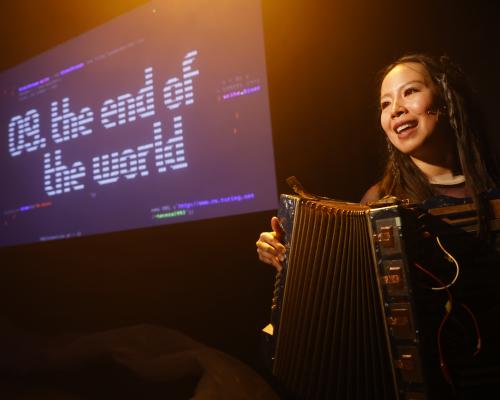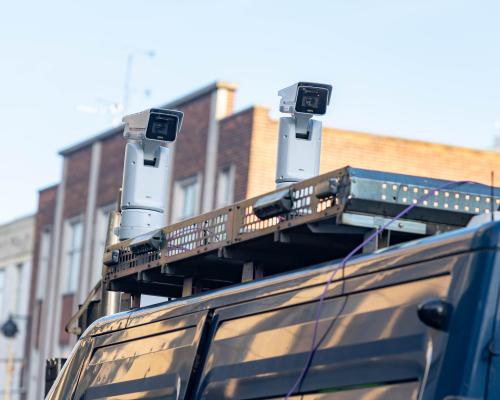
Every new technology unsettles us because it confuses our boundaries. The radio announcer who appears in our living room; the movie star we see on a screen; the relative’s voice we hear on a phone: they all mix up our sense of the real and the imagined.
So it is with artificial intelligence. A poem generated instantly by ChatGPT feels as magical to us – and as magically wrong – as the first printed books must have done to an illiterate population, unschooled in mystical Latin. How to account for something that communicates like a human being, yet is not physically present?
It is an uncertainty that haunts the AI-themed plays on this year’s Edinburgh fringe. It also accounts for their apocalyptic mood. Do we even have a future, they all seem to ask, or are we bequeathing it to the machines?
Take Dead Air, in which playwright Alfrun Rose stars as Alfie, a kind of female Hamlet. Like Shakespeare’s vacillating hero, she communes with her dead father and grows furious with her mother for hooking up with a new man, John, an old boyfriend. As Alfie sees it, John is in line to become her stepfather with unseemly haste.
The difference with Hamlet is that her dad is no ghost but an AI simulacrum, powered by a service called AiR.
For as long as she pays the subscription (no easy feat), Alfie can hang on to her dead dad and hang on, too, to her sense of survivor’s guilt and unfinished business. The online service, with its chirpy operatives and Stayin’ Alive hold music, supplies her with a nearly-but-not-quite reproduction of the real man. If something feels off, she can switch the temperature controls to turn him from mechanical to fanciful. Whether he is a comforting replacement or a cynical means of data mining is a moot point.
The question Rose raises in an absorbing storytelling show is less about the limits of digital technology and more about processing grief. Alfie’s fury with her mother and rage about John is little to do with them (they seem as perplexed by her outbursts as Gertrude and Claudius are by Hamlet’s) and a lot to do with her miscarriages. Conflating the death of her father with the loss of her children, she is frozen into inaction. Having a virtual father only prolongs her inertia. Whatever this AI father is, however lifelike, he can never be the real thing.
The AI chatbot played by Elisabeth Gunawan in Stampin’ in the Graveyard also purports to have our interests at heart. She is there, she explains, authentically stiff-jointed, to ease our transition to the end of the world. Her name is Rose and if she starts hallucinating, as AI is wont to do, a rose graphic flashes up on screen.
Through an interface that is all glitches, network errors and messages saying “Not applicable is not applicable at this time”, she polls the audience to guide her through optional storylines. Each show plays out with a different combination of scenes in a tech-savvy production co-created with movement director Matej Matejka for Kiss Witness.
Hard to say what the story adds up to – it is a catastrophic tale that begins with a couple seeking marriage guidance from a vending machine and ends with forced separations and closed airports – but it is fascinatingly done with the audience tuning in on headphones and Gunawan playing a steampunk synth-accordion hybrid created from recycled electronics. If this is the future, we are in for a world of computer errors and digital indifference, a hostile place for our messy human interactions.
Tackling the technology even more directly, New York’s Angry Fish Theater and the Ally Artists Group use AI to generate a bespoke script for each spectator. Before the start of AI: The Waiting Room – An Audiovisual Journey, you fill in a questionnaire, truthfully or otherwise, about your ambitions, loved ones and legacy. By the time you are in the theatre, there is a custom-built story ready to play out in your headphones, delivered by a freakily realistic voice.
The sections unique to you are folded into a bigger tale, experienced by everyone, about societal breakdown and hi-tech rejuvenation. Nobody else will ever hear my yarn about a sugary moon, a bag of gold and 61 statues. This is a good thing, much as I enjoyed the novelty of hearing a romantic story about me and the family cat.
All this takes place as we move freely around a studio, watching a monochrome animation (perhaps also artificially generated) and following instructions intended to make us play characters in our stories. These demands for audience participation seem forced – especially a misjudged prompt to “dance party?” – but it is a quirkily intriguing attempt to be humanly creative with this inhuman technology.
• Dead Air is at Pleasance Courtyard until 24 August. Stampin’ in the Graveyard is at Summerhall until 25 August. AI: The Waiting Room – An Audiovisual Journey is at Studio at C Arts until 16 August
• All our Edinburgh festival reviews




